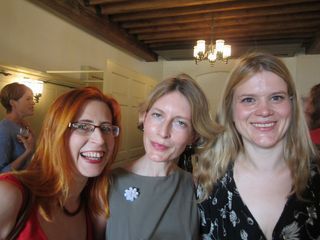Mary Beard's Blog, page 30
October 19, 2014
What we get wrong about Lord Elgin
I have long said that the rights and wrongs of the Elgin Marbles debate are more complicated than we often make them seem, and that the argument would be much more productive if we managed to see some of the complexity.
Now that Amal Clooney has taken up the case, all the old over-simplifications are crawling out again. Personally I hold no brief for Lord Elgin (I have remained uncomfortably "on the fence" on the whole issue for many a year). And it is important to admit that there is an awful lot we dont know about him and his motives (to be honest, it is completely uncertain whether he was looking to save a precious antiquity or looking for some nice decoration for his stately pile, or some combination of the two).
But there are some aspects to the story as it is now told that are simply WRONG.
For a start, the idea that Elgin went up to something like the "pristine" Acropolis we now see and gave orders for the finest sculptures from the finest temple to be removed and parcelled off to Britain is far from the truth. In the early years of the nineteenth century the Acropolis was an Ottoman garrison base with a rather squalid village attached. The antiquities were all encroached upon by shacks, houses, offices and stores, and there is no doubt that some of the ancient marble was being reused for various garrison purposes. How endangered the sculptures were is hard to say, but Elgin was not taking anything from what we would think of as an archaeological site (with or without permission -- the extent of his "firman" is not entirely clear, and anyway we dont have the Ottoman original, only an Italian translation, accurate or not).
Second, it is not the case that the British government -- avid plunderers to a man -- eagerly snapped them up when Elgin offered to flog them (by 1816 being close to bankrupt thanks to his Marbles). There was a long discussion and inquiry by a Select Committe of the House of Commons, which went through many of the issues we now discuss, including Elgin's title to the sculpture. Of course, they may have reached the wrong conclusion, but there is no doubt that they discussed the whole issue in minute detail (you can read the verbatim proceedings here).
Third, the Marbles were not a symbol of "Greek nationhood" when Elgin took them. Whether we think what he did was right or wrong, he was not doing the equivalent of walking into the Tower of London and pinching the Crown Jewels. The Marbles became a national symbol in a sense in their loss, and with some help from the later, classically focussed, monarchy of Greece. That is not to say that everyone approved of what Elgin did at the time. Byron famously penned verses attacking Elgin (though he still was happy enough to hitch a lift on one of the boats carrying the Marbles away from Athens). And Edward Daniel Clarke is supposed to have wept when he saw the Parthenon sculptures being taken down (though his finer feelings did not prevent him removing a famous sculpture from Eleusis and taking it back to Cambridge, to the howls of protest of the local Eleusis residents).
None of these factors are clinching either way (they don't push me off the fence). But we do have to understand the early nineteenth-century background properly if we are to judge Elgin's actions properly or fairly.
October 15, 2014
A Latin learning parable
I think anyone who teaches Latin in a university (or school) in this country will recognise what I am about to describe. You hand out a student questionnaire (or more likely now you post it online) and many of your diligent and clever students will reply (with boxes ticked, comments inserted) that they feel uneasy about some key pieces of grammar (usually the gerund) and that they want more face to face teaching, more classes (on the gerund).
The easy solution (and the apparently student friendly one) is to provide more classes. Sounds obvious. But it probably takes about 20 years in the game to see how misjudged that might be, and how it might not be student friendly at all. To be sure, just occasionally, extra teaching is what's needed, but 90% of the time it is not .. and the teacher's job is to explain why it is not.
1. The basic answer is to insist that grammar learning is something which no one else can do FOR you. A class might help you see the principle, but the teacher can't actually learn it for you.
There is a bigger issue here about the whole basis of learning -- and the need to break the increasingly common assumption that you are only "learning" when you are "being taught", when actually you are learning best when your head hurts in the library (that's a fact that sits uneasily next to the idea that you should divide your £9k a year by the number of contact hours you are receiving....).
To put it a different way, I'm there to help anyone, for as long as it takes, who has worked on the gerund from the many excellent text books there are, and still doesnt get it... but I am not so keen on doing another presentation to a mixed group on "verbal nouns/adjectives", which they could just as well read.
2. Another answer is to point out that those that worry most are not necessarily the worst equipped ("remedial classes" in my experience are often populated by the "worried well", who are about to storm their way to a first, even if they dont realise it). Classicists have always been cowed by the fear that they "don't know their grammar"; when in truth part of "knowing your grammar" is actually not quite getting it, because it really doesn't quite add up.
Besides, most Romans didnt understand the bloody gerund either.
3. Another is to wonder whether the fixation on grammar and its rules might not be a metaphor for a worry of a different kind. Am I really getting this subject? Because if that is the case, then throwing more teaching at the problem might be completely beside the point.
In teaching students, in other words, it is a given that their anxieties are important and to be taken seriously -- but they might not have diagnosed the correct solution.
And the parable? Well, there are problems with this comparison (little with large), but -- as with all such -- there's a point here too. When I hear UKIP talking about people's worries (on immigration or whatever), and when I see the mainstream parties following them, and when I see the simple solutions coming out, I wonder who is going to say that those simple solutions might be just wrong. That, however commonsensical it might sound, "taking control of our borders" might no more hit the spot than "more classes on the gerund".
October 11, 2014
The wittiest man in England
More than 25 years ago, I was a very junior lecturer in Cambridge -- and I had been put onto a rather grand (but in truth not very important) University Committee.
Let me reassure you, such committes are not like that now (or have I just got older?).
I remember vividly walking into this suitably grand room at the appointed hour, and the chair (the then vice-chancellor) asking "who are you?". It came across more preemptorily and rudely than it was probably meant, but it did not exactly put me at my ease. (Imposter syndrome is sometimes real.)
Apart from that, I really remember only one thing about the proceedings. The point of the meeting was to choose some eminent person for a more-or-less sinecure at the uni. As we narrowed it down, one very senior member (and cleric) remarked of one of the leading candidates for this sinecure, who happened to be another very senior cleric indeed, "he's quite the wittiest man in England". (I am not going to say who either of these gents were; but they are both dead.)
I still recall wanting to say, "well mate, come down The Granta (local pub) of a Friday evening and I bet I can show you some rivals". I think now that I would have nerved myself to say that. But, of course. back then I didn't (and, after the "Who are you?" greeting, I'm not surprised). I did however go home and reflect more broadly on the totalising vision of the British elite. Isn't it extraordinary how they equate those people they know with "the country" (here defined as "England ... not sure if I am pleased about that).
I guess it is partly what Grayson Perry is talking about in his New Statesman edit, about the "great white male".
I hadn't thought too much about this little incident till I heard an interview with Sir Peter Bazalgette on the Today Programme last week (it's here, I hope, about 10/15 minutes from the end). Bazalgette is currently Chair of the Arts Council and on the Blue Plaques panel. He was on the programme to publicize the new Blue Plaque on Raymond Chandler's house (a good decision, I'm happy to agree).
And I was pleased to hear him credit the possible influence of his Classics master and headmaster, Arthur Gilkes, over Chandler's writing. So far, so good. It was when Bazalgette referred to P G Wodehouse and Raymond Chandler as the "two greatest stylists in the English language last century" (he did put an "arguably" in somewhere) that I saw red.
At that point the "wittiest man in England" moment came over me. Greatest stylists in what sense? In the books I like? Or have read? And how do you weigh up style in different genre (Joyce, Eliot...?). I have to say that the words quoted by Bazalgette ("an hour crawled by like a sick cockroach" wouldn't send me rushing... ), much as I like Chandler.
It seemed like another case of the British elite's tendency to equate the "universe" with "those I know". It was only a bit later that I discovered that Bazalgette and Chandler and Wodehouse (and Nigel Farage as it happens) had all been to the same school: Dulwich College. I am sure it was just a coincidence, but still it made it worse.
October 6, 2014
A day at Cheltenham
I had a great day at Cheltenham Literary Festival on Sunday. To be honest, Cheltenham is a bit of a schlepp from Cambridge, so my deal is to go there and back in a day -- and I do as many gigs as anyone wants me to fit in (provided that it includes our now traditional "How to read a Latin poem" slot, with Peter Stothard and Llew Morgan) .
This year (in reverse order) I did a lecture on Roman Laughter, we three did a session about the Epigrams of Martial (in Latin), and when I arrived I went straight into a session on "ageing" with Lynne Segal (who has just done a book on the subject) and Libby Purves. It was a rather a good-humoured and extempore event, riffing on the idea of what it was to be old.
In some ways it picked up on a series of British Academy debates I had been involved with, on the same subject. So I was ready to go with some of the questions and arguments and provocations. Why do we think it a compliment to tell someone that they look younger than they are? Isnt it actually great not to have periods ever again? (That got some of the warmest applause.)
And, in the middle of all this, I had fun meeting people -- an old student, a couple of great potential students for Classics, friends from all over the place, and (at close of play) a great group of commenters (you know who you are!).
Things took off after this in unexpected ways. There was a perfectly accurate report of what I had said about ageing in the Telegraph -- though it did rather give the impression that I had given a "position paper" on the subject, rather than just contributed to a discussion (yes -- I had said, and meant, that we should try to reclaim the word "old", but it was an intervention rather than a manifesto).
This went, as you will have guessed, in various different forms into various different papers.
And in prompted interest from large numbers of radio and tv statins, who thought (flatteringy I guess) with the story of reclaiming the word "old". So far, so ordinary. I mean what do you expect, I guess?
Rather more surprising (shocking?) were some of the under the line comments on these articles. I can understand that people did not quite realise that I had not set out to make a big point, but I was actually just talking in a pretty free flowing discussion. But the comments went beyond the usual sorts of sexist insult (gosh she is only 59, she looks 10 years older; please do somethimg about you hair love -- same old, same old).
The one that took the biscuit was one on the Telegraph site (the moderators have now taken it down).It looked forward to the time "when she has been soaked in embalming oil and put on display in the mortuary window". I retweeted this, as an exempli sui. But soon enough there was some bloke on the Mail website saying that I was "moaning" (hang on.."soaked in embalming oil"? moaning?), and another saying that I (and I guess others) was simply using trolls as a way of drawing attention to myself. (To be honest, the Mail website was less offensive -- sometimes critical but not offensive -- than the Telegraph.)
You don't quite know what to do at that point (threats of rape to make yourself famous? come on?). Go on engaging, I guess. But it there is something pretty sad about these comments.
October 4, 2014
In praise of the bus pass -- for oldies
I must declare an interest on this one. When I am actually 60 in a few months time, the thing I am looking forward to is going down to the station to get my Senior Rail Card (I had rather hoped one would come as a present, but apparently you cant actually get one until you have passed the big day -- no getting them ready in advance.) On the completely practical side, it allows you to get cheap fares on the 9.15 to London, when with the Network Railcard you have wait till 10.15. How good is that?
Anyway, yesterday morning as we lay in bed, listening to the news about the likely demise of the senior bus pass, the husband said that there was something more to this, than just giving free travel to pensioners who could afford it anyway. Wasn't it actually subsidising the bus companies to run routes that they woud otherwise say were uneconomical? So wasn't it good for us all (even on a selfish definition)?
I have to confess I pinched the thought and tweeted this "truth" (as it seemed to me), partly to check out that this really was the case -- which it does seem to be, at least according to the Twittersphere. I think that the bus company gets a payment for every journey taken on a pass. And this indeed is one important support for keeping "uneconomical" routes working.
But I fell to thinking too about all the other simply economic benefits of the pass that get forgotten.
As some tweeters pointed out, you had to add into the equation the benefit of keeping some of the very old out of their cars (in which some -- lets be honest -- are dangerous). If the ninety year old pluses can just hop on a bus into town, doesn't that both help the planet and prevent a few likely accidents.
Then again, what about the benefit to the care bill (and the economy more generally) of encouraging the elderly out and about to visit friends and relatives, pubs and tea-shops? One half of government agencies are waxing lyrical about the virtues of keeping the old active (there's no surer way of being on the path to needing "care" than sitting at home all day) -- when the other half is busy taking the bus pass away.
OK you might say, why give a bus pass to those who could afford the fare anyway, or afford to buy one, like the railcard? Well, there are several answers to that. First is the expense of means testing the damn thing. Second is the positive encouragement that having a pass gives to people who probably wouldnt otherwise hop on the local bus (feedback loop into the other advantages I just mentioned).
I have no idea how you begin to really price the bus pass, taking account eg of the potential savings to the care bill, ambulance and traffic costs etc. But I am damned sure that there is not much attempt to go beyond the headline book-keeping costs of the thing, under one budgetary heading only.
Which is typically unjoined up. It's rather like "saving" on home care costs -- which trims the budget to Social Services, while having people stay in vastly more expensive acute hospital care for days and days (because they cant be sent home, because there's no home care, etc etc).
It's just not thinking things through.
October 1, 2014
Cheltenham Literary Festival - for Latin lovers
I am off to Cheltenham this Sunday (long day for me) and looking forward to seeing some commenters after the signing session after my last gig. Meet in signing tent. No need to bring anything ... though it would be quite helpful to have confirmed numbers (via blog comments).
I am doing three gigs. One is a discussion with Lynne Segal (chaired by Libby Purves) on the pleasures and perils of ageing (it's called Oh Do Shut Up Dear... where have I heard that title before?). One is a talk on Roman laughter (based on the book, but with a bit more). And in between, we're doing our usual How to Read a Latin Poem slot.
This year it's the epigrams of Martial
In the past we have done rather serious "classics" -- Virgil, Horace, etc -- so this is a bit of a departure. And the question is a bit different. I guess that with Virgil and the boys, people by and large know that they are somehow "important" amd "worth studying". The question is, how to make them mean something for you? And (as Peter Stothard is always reminding us) how to work out what value-added the Latin gives, especially if you have only got a few words of it. Why does word order matter? Why does metre matter? And so on.
I guess with Martial, it's a bit different. The question is, what kind of artistry is there in these (sometimes) two liners? They may be quite simple to translate (especially with the crib that we will hand out) -- but is there more to them than appears? Are they wortk thinking about harder? (Our answer is going to be yes, you will not be surprised...)
And another issue concerns the raunchy ones. Now I dont think we had better pick the raunchiest for our very mixed (in every sense) audience. But we do have to think what the sexual themes are doing in these little poems, and why the ones that get omitted from the more staid collections might be worth reading with attention too.
Anyway, we're just getting the final selection together. So if you have a favourite that you would like discussed, can't promise it will fit, but let me know. Or any themes you would like us to talk about?
Cheltenham is, after all, the only literary festival to my knowledge that actually does LATIN in LATIN.
September 27, 2014
Marriage à la mode
As today is our 29th wedding anniversary, I have just realised that we share the date with George Clooney and Amal Alamuddin. Not that there is any other similarity beyond the 27 September date.
Ours took place in the Cambridge Register Office, Shire Hall (it was before the days that you could use other locations). It was, I recall, all rather agreeably scruffy. And during the ceremony itself, a notice was hung on the door saying "Quiet Please, Marriage in Progress" (which I had rather wanted to pinch, but didn't quite get the opportunity). I was not anyway my nimblest being eight months pregnant and pretty vast.
It also had more than a tinge of the "municipal" about it. In the run up to the occasion -- I think when we went to pay the cash -- we had had some debate with a sightly ponderous bureaucrat about the ceremony itself. We had (not unreasonably you would have thought) asked to see a text of the exact words to be used. This proved difficult to start with, but eventually out of the man's bottom drawer came a laminated card marked "For the Deaf".
Having a quick read, we asked if he might please take the "Till Death Us Do Part" clause out.
We weren't planning on a temporary arrangement but, as in our small and jolly planned nuptial party almost everyone apart from the bride had actually been divorced, it seemed a bit "in your face" or misleading to use that particular phrase. This suggestion was met, as I guess you can imagine, with some reluctance.
But it was the kind of reluctance that makes you dig your heels in. We had already done a bit of research on this, and had easily ascertained from one or two legal textbooks (it was long before the days you could google these things) that the only words a legal marriage required was a public declaration of willingness ("I do") and the ascertaining that there was no just cause and impediment to the union. So we persisted -- and asked him if there was any occasion on which he ever varied the rules.
Well, he admitted, he didn't actually use "Till Death Us Do Part" when he was doing death bed weddings in Addenbrookes (as it felt a bit tasteless). At which point he realised that he had snookered himself and gave in (not without a jibe, as we left, about how we'd be wanting "to the exclusion of all others" to be omitted next).
Anyway it was a funny old ceremony, with the state aping everything the church did except the actual religion (and including a cheap yellow cushion on which to put the ring as it waited to be slipped onto the bride's slightly swollen finger). But it was fun and funny for all that. And as I look at the goings on in the Clooney wedding, I can't help but be really delighted for my own.
If someone would explain to me why a guy like Clooney, whom I have always thought rather sensible, and the obviously clever Ms Alamuddin, actually want to go through all this, beetling across the Grand Canal from one extravagantly pricey hotel to another, I'd love to hear. (FFS the combined cost of the guests' bedrooms would probably keep South Sudan afloat for a month or two -- sorry to sound so curmudgeonly, but it's the sheer public glare of it all ...)
Wouldn't they actually have had a better time at the local Register Office I keep wondering.
September 24, 2014
My "birthday"
There is something about Newnham Classicists that seems (I am hoping; cross fingers everyone) to lead to longevity. I am about to be 60, my old Director of Studies (Joyce Reynolds) is about to be 95 (opinions I fear differ, others say she has just become 95), and my old supervisor and friend, Pat Easterling is just past 80. So as there was a a wonderful moment whan we could all claim a sort of birthday together: 235 years of Newnham Classics.
Anyway, thanks to generous funding by the Classics Conclave, we had a wonderful (non) birthday party in the Tower of London, with a great mix of ex-students, friends and colleagues. (There will be more celebrations later I promise, but please do check your spam folder before complaining about not being invited, because we had large numbers of invites going into cyberspace).
I have to say that the best bits of the party for me were meeting old mates and trying out the Tower experience (my only visit apart from last week had been when I was 5).
The party itself was amazing. And the truth is that the cakes were truly out of this world (and classically themed). You could pick a Roman emperor biscuit or an Iliad cookie, or a birthday party temple (at the top of the post).
For me, all the flummery and the fun was great. But most of all I thought about how this classical genealogy had really promoted and supported me and those like me. We had three generations of women who had spent their life supporting other women getting into the academic world (and I think none of us is from a toff background, by the way), and are determined to go on doing so.
And we are determined still to support each other. Joyce (aged 95 going on 96?) is one of the best Roman historians/epigraphists in the world. Last night I spent an hour with her discussing how to translate (understand) some of the most raunchy Pompeian graffiti that there is. (Oh help is that really "sucking off"..?aggh). And actually we got quite a long way in making sense of this almost senseless stuff...
But for me that bottom line was simple. If you had told me forty years ago that I would be here in 2014 partying and debating with Pat and Joyce, I woudn't have believed you!
Oh well, if anyone wants to know how to support the continuation of this feminist project.. do email me (mb127@cam.ac.uk).
September 20, 2014
Laugh-in
I have got a bit fed up with tradtional academic "conferences". Don't get me wrong, some conferences can be really mind-changing, the papers excellent, the networking fun, the resulting publication a (prompt) milestone. I think I am fed up with the default assumption that conferences are a necessary good. Let's be honest, there are some when the papers are not on the topic they are supposed to be (someone's bottom drawer), when they go on too long (so whoops no time for any questions, very sorry, we must press on). Then there is the inevitable publication (often exploiting some poor graduate student), which appears years after the event, and missing some of the best papers (which had, oh dear, been already promised elsewhere).
I'm not saying this because I am a solitary soul who doesnt want to talk to other scholars in the field. Far from it. But I do like to talk in an open ended way, really about the topic concerned, where people are really frank, and nobody is bothered about what the paper will look like when it's in the "conference volume".
A few years ago I managed to get some funding together to run a day's workshop on the Roman Triumph. I had just published a book on the triumph, as had a number of other people (in different countries and languages); and there were even more who had just written articles. We had a nice dinner, then sat down the next day and went through all the things we had agreed and disagrred about, and what we thought the remaining problems were. There were no papers, just discussion (on the basis of each others' work -- which we had more or less read).
The bottom line was: we are all going to be reading each other's work, so wouldn't it be more productive to tell each other what we think face to face, and discuss -- rather then merely pen a waspish (or otherwise) review. It turned out to be one of the most rewarding academic days I had ever spent.
The trouble is, it is extremely hard to raise money for this kind of thing from any of the usual sources. Try saying to the British Academy that "there are no plans for publication". More than that, try telling them that "we are not even going to have any papers that could be published". Dream on for your conference grant. It's all part of the current assumption that direct publication is the only form "knowledge transfer" . . . when in fact what I said and wrote about the triumph after our workshop was significantly different from what I had said before (so isn't that "knowledge transfer" too?)
Anyway, to get to the point: I was lucky enough to get generous funding from a generous donor to host a similar event about ancient and modern laughter (on which there has been a flurry of recent work). It was the same format: we had an open seminar given by Kristina Milnor on Thursday late afternoon (so people who were not laughter types could come and enjoy an event), then a nice dinner on Thursday for the main participants (hosted by Professor Schofield above), and then a day's discussion with about 20 of us on the Friday.
We were partly ancient laughers (inc Stephen Halliwell and Michael Silk and Catherine Conybeare) and partly modern laughers (inc Matthew Bevis). And we debated a whole range of things from questions of theory (what IS it to theorise laughter? how totalising does any theory aim to be?) to questions of control (why do we treat laughter as uncontrollable, when it usually isnt) to definitions of comedy and issues of gender (how is laughter a marker of gender difference).
Once again, it has really helped me to think and (I am sure) write differently about laughter. And despite our general view that laughter is in fact controllable, there was one outburst of (almost) uncontrollable laughter.
It is I fear rare for academic laughter to be joyous and funny, but this one was.
September 15, 2014
Your Paintings
I've been getting to know the BBC's excellent Your Paintings website again. This is a joint enterprise with the Public Catalogue Foundation -- and the aim is to get every oil painting in public collections in the UK (from council offices to galleries, universities to National Trust properties) online, and searchable. (Not quite sure what will happen if Scotland goes independent: wait and see I guess.)
A couple of years ago I put together a little presentation on the site, using its collection, to try to explore myths and monsters of ancient Greece. But there are other great guided tours too, like Monty Don's gardening pictures or a splendid set of self-portraits chosen by Laura Cumming. anyway just last week I had another dip choosing some images of the changing faces of heroism -- with World War 1 in mind, but also thinking about a deeper history, back to antiquity.
It's going to be a little segment in this mooc, and I don't think it is giving anything too much away to say that one of the pictures I talk about is one of the Stanley Spencer panels from Sandham Chapel (above: it's the filling of water bottles during the WW1 Salonika campaign). That chapel is where I went on one last day out with my excellent and much loved publisher before he died, so it's got a special resonance for me.
I know, by the way, I have been a bit rude about moocs in the past -- and you might be wondering what caused the change of heart. Well, there's been no change of heart really. I've always though moocs were great as add-on enrichment; it's those that pretend to be a substitute for a uni course that worry me.
Anyway if you havent discovered Your Paintings yet, it's a real gem. To be honest the search function isnt quite perfect, so if you dont instantly find what your looking for, try a slightly different search. I might have been being stupid but it took me several goes to track down Poynter's "Faithful unto Death" but I found it in the end.
And it would be nice to think that the project will manage to get the necessary permissions to complete the job, and that the site will really be a gallery of the nation's paintings. Naming no names, I noticed that not all Cambridge Colleges had been included yet (mine has!). Which is a bit of a pity as they have some really interesting stuff.
Some come on guys, sign up and lets have this great job finished.
Mary Beard's Blog
- Mary Beard's profile
- 4110 followers














